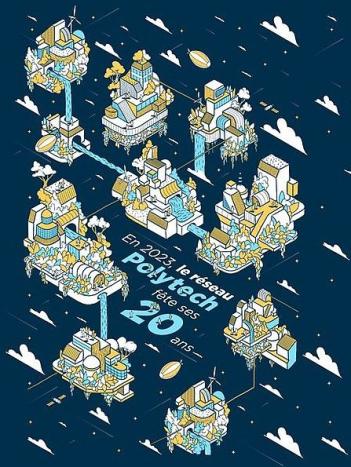
The network of French engineering schools, Polytech, celebrates its 20th anniversary this year. Since its creation in 2003, the network has grown to become one of the largest networks of engineering schools in France, offering top-level training in fields as diverse as IT, energy and telecommunications. This anniversary is an opportunity for network members to reflect on past achievements and future challenges, while celebrating the contributions of its alumni to society.
In 2023, the Polytech network will have 15 member schools and 5 associate schools.
A little history...
The creation of a network
Promoted at the end of the 1990s by Claude Allègre, then Minister of Education, the idea of a university polytechnic school was intended to reduce the number of engineering schools, which were essentially considered too small, too numerous and too inconspicuous.
This gave rise to the desire to see a new type of engineering school emerge within universities, with a twofold objective: to create broad-spectrum engineering schools, bringing together different highly specialized courses that were previously modest in size, and also to create a "generic model" of engineering training, sharing the same strategies within an open network, particularly internationally.
As a result, the first university polytechnic was created in Nantes on December 21, 1999 (published in the Official Journal on January 1, 2000). By merging, the Nantes engineering schools set in motion the process of regrouping within universities and creating new polytechnic schools. (2001, Polytech Marseille, then in 2002 Orléans, Lille, Tours and Grenoble).
The Polytech network was then created in stages. For the 2003 recruitment campaign, the "Polytech'ville" brand was established. In 2003, a joint charter was signed by the first 7 Polytech schools (Nantes, Marseille, Lille, Orléans, Tours, Grenoble, Montpellier): the adventure began! The network then expanded with the merger of the Eiffel network (CUST, which became Polytech Clermont-Ferrand in 2006, EPU Lille, EPU Grenoble, EPU Montpellier) with the Polytech network on June 17, 2004.
The network then expanded rapidly with the creation of new Polytech schools:
- April 2005: Creation of Polytech Nice Sophia
- July 2006: Creation of Polytech Paris-UPMC (now Polytech Sorbonne)
- 2006: Creation of Polytech Savoie (renamed Polytech Annecy-Chambéry in 2007)
- January 2009: Creation of Polytech Paris-Sud (now Polytech Paris-Saclay)
- September 2011: Creation of Polytech Lyon
- April 2017: Creation of Polytech Nancy
- June 2019 ISTIA Angers becomes Polytech Angers
The 15 member schools are public university schools under the authority of the French Ministry of Higher Education, Research and Innovation, and award engineering degrees recognized by the Commission des Titres d'Ingénieur (CTI). With 12 areas of training, over 100,000 graduates, including 3,900 per year, i.e. 10% of all engineering graduates in France, the Polytech schools are one of France's largest engineering training networks.
Since the creation of the Polytech network, a coordinator, elected for a two-year term from among the current directors, presides over the directors' assembly (Executive Committee), defines a "roadmap" and represents the network in dealings with various stakeholders and bodies.
Polytech network coordinators
- Bernard Remaud: before 2004
- Jean-Louis Bon: 2004 - 2006
- Jean-Louis Billoet: 2006 - 2008
- Jean-Marie Navarro: 2008 - 2010
- René-Louis Inglebert: 2010 - 2012
- René Le Gall: 2012 - 2015
- Laurent Foulloy : 2015 - 2017
- Serge Pravossoudovitch : 2017 - 2019
- Yves Bernard : 2019 - 2021
- Emmanuel Perrin: since 2021
The evolution of the Polytech network
The Polytech network has come a long way in 20 years!
Several joint projects, including the AVOSTTI project, have seen the light of day and have enabled us to develop and strengthen joint actions with a common objective: "accompanying all students towards success".
In 2017, the Polytech network adopted strong values established as pillars of the network: respect and openness, high standards and creativity, responsibility and transparency, and anticipation and team spirit. By sharing these values, the Polytech Foundation federates the collective and gives concrete form to the network's strategic orientations.
In support of these values, a DDRS charter was signed on November 19, 2020, in which the schools of the Polytech network make strong commitments to validate their approach to sustainable development and corporate social responsibility. One of the priorities is to train engineers who are responsible for sustainable development and citizens of their time.
Creation of associate school status
In 2023, the Polytech network will include 5 associate schools: ENSIBS, ENSIM, ESIREM, ISEL and ESGT.
The 5 associate schools share common values with those of the Polytech network, and operate in a similar way to the 15 member schools. To become an associate, the school must be able to offer students several specialties accredited by the Commission des Titres d'Ingénieur (CTI), and must have graduated at least two classes of engineers.
A ceremony to celebrate 20 years
During the Polytech network's annual conference on March 28 and 29, an official 20th anniversary ceremony will be held in the Grand Amphithéâtre de la Sorbonne (Paris 5e). 500 people are expected to attend this exceptional event. A webdocumentary on the Polytech network will also be shown.
